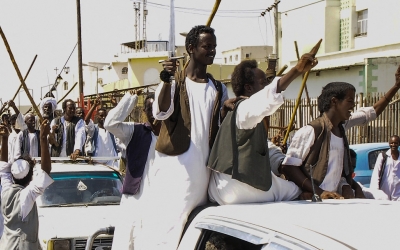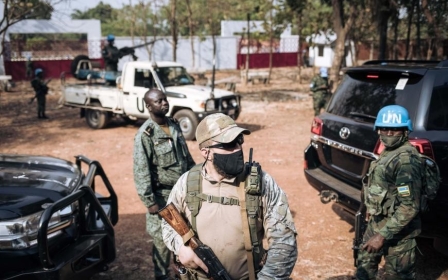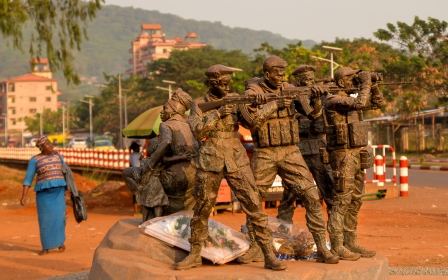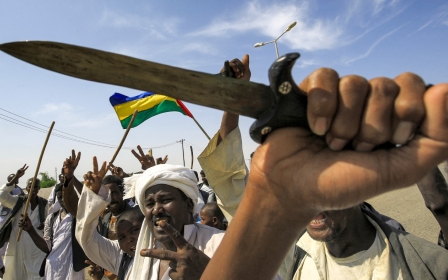Russian foreign minister blasts western powers and defends Wagner Group in Sudan
Russian Foreign Minister Sergei Lavrov blasted western powers and defended the mercenary Wagner Group in a press conference held at Khartoum Airport at the end of his two-day visit to Sudan.
The Russian minister, who held separate meetings with Sudan's ruling General Abdel Fattah al-Burhan and his deputy, Rapid Support Forces (RSF) commander Mohamed Hamdan Daglo, commonly known as Hemeti, said that proposed Russian military bases on Sudan's Red Sea coast were going ahead.
'The mentioned company (Wagner) is working on fighting terrorism in these countries'
- Sergei Lavrov, Russian foreign minister
Lavrov arrived in Khartoum late on Wednesday as part of a tour seeking to expand Moscow's influence that has included trips to Mauritania, Mali and Iraq.
Sudan, which was cut off from billions of dollars in international financing after the October 2021 military coup led by Burhan, last week hosted a delegation from the Israeli foreign ministry.
Envoys from the US, UK and European Union were in Khartoum at the same time as Lavrov.
New MEE newsletter: Jerusalem Dispatch
Sign up to get the latest insights and analysis on Israel-Palestine, alongside Turkey Unpacked and other MEE newsletters
Russia has interests in mining - particularly gold - in Sudan, and is keen to strike deals on the export of fertiliser and wheat to the African country, according to sources in Khartoum.
The presence of the Wagner Group in Sudan, where it is thought to have connections to Hemeti, and in the neighbouring Central African Republic (CAR), where the mercenaries are fighting local rebels on behalf of the government of Faustin-Archange Touadera, was addressed by Lavrov.
"These companies are private military and security companies coming to these countries according to agreements with the governments that have sovereignty over their countries," he said.
"The mentioned company (Wagner) is working on fighting terrorism in these countries. We also welcomed the decision of the Sudanese government to close the borders between Sudan and CAR in order to prevent the movement of fighters and terrorist groups."
Founded by businessman Yevgeny Prigozhin, who is close to Russian President Vladimir Putin, western nations see Wagner as representing the interests of Moscow abroad.
In January, Hemeti claimed that he helped stop a coup to overthrow the CAR government that was being plotted over the border in Sudan.
The militia leader said that in late December he stopped forces moving from inside Sudanese territory to oust the CAR leadership, stoking ongoing speculation about the role of Sudanese troops and Russian mercenaries in the nearby conflict.
Red Sea bases
A key Russian ambition in Sudan has been the establishment of a naval base on the Red Sea coast. Last year, as Russia invaded Ukraine, Hemeti visited Moscow to discuss the prospect with officials there.
Hemeti brought the proposal back with him to Khartoum but, sources familiar with the talks told MEE, Burhan opposed the Russian plan. Burhan and Hemeti are increasingly at odds both at home and abroad.
MEE had understood that the port project would be developed by the UAE, but at the airport press conference Lavrov was bullish about Russia's prospects.
He acknowledged the existence of Russian mining companies operating in Sudan and said that agreement had been reached previously on a naval base but was awaiting Sudanese legislation to implement it. Such a deal had been reached under President Omar al-Bashir, who was toppled in a 2019 uprising.
"You know this agreement has been signed earlier between the two countries and it is only waiting to be legalised," Lavrov said, of the Russian naval base.
Turning his attention to the wider world, Lavrov accused the western delegation that visited Mauritania and Sudan at the same time as him of obstructing his visit and the development of ties between Russia and African countries.
"Western delegations are following our steps and trying to hinder our efforts towards having a multipolar world," Lavrov said.
Drawing a comparison to Germany's defeat in World War Two, Lavrov warned western powers against continuing to assist Ukraine in its war against Russia.
Middle East Eye delivers independent and unrivalled coverage and analysis of the Middle East, North Africa and beyond. To learn more about republishing this content and the associated fees, please fill out this form. More about MEE can be found here.





